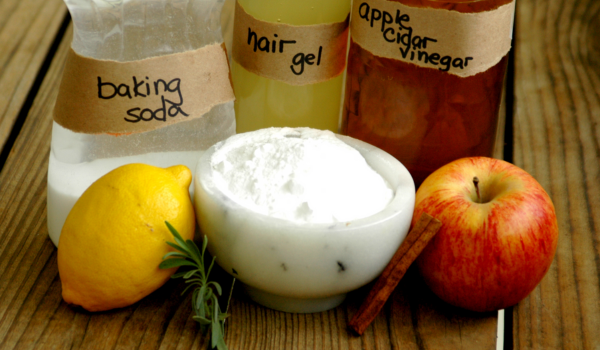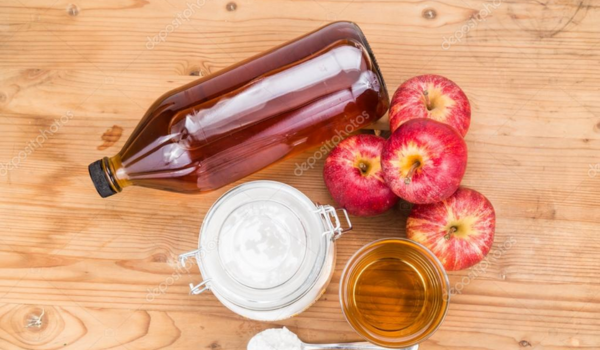Apple Cider Vinegar & Baking Soda for Hair: Benefits & Tips
Apple Cider Vinegar and Baking Soda for Hair: Benefits, Uses, Tips, and Safe DIY Treatments

Are you tired of dull, lifeless hair? Looking for natural solutions that can restore shine, improve scalp health, and reduce buildup without harsh chemicals?
If so, you’ve probably come across the buzz around apple cider vinegar (ACV) and baking soda for hair, a simple, affordable DIY combo that has taken the beauty world by storm.
In this detailed guide, we’ll explore everything you need to know about using apple cider vinegar and baking soda for hair care: how they work, their benefits, how to safely use them, and what you should watch out for.
Why Natural Hair Care?
Hair is more than just strands; it reflects your health, lifestyle, and care routines. Conventional hair care products often contain harsh chemicals like sulfates, parabens, silicones, and synthetic fragrances that can strip natural oils, irritate the scalp, and damage hair over time.
Natural hair care has grown popular because:
- It uses gentle, often edible ingredients.
- It reduces exposure to potentially harmful chemicals.
- It supports sustainable and eco-friendly beauty.
- Many natural remedies have centuries of traditional use and anecdotal success.
Apple cider vinegar and baking soda are two of the most talked-about natural ingredients, promising to restore hair’s natural shine, balance scalp pH, and clarify buildup.
What Is Apple Cider Vinegar?
Apple cider vinegar (ACV) is made by fermenting crushed apples, turning the sugars into alcohol and then into acetic acid through bacterial action.
The resulting vinegar contains organic acids, vitamins, minerals, and beneficial compounds like polyphenols.
Key Properties of ACV:
- Acetic acid: Gives ACV its acidic pH (around 3) which helps balance scalp pH.
- Antimicrobial: May help control bacteria and fungi on the scalp.
- Natural clarifier: Removes residue and buildup from styling products and hard water minerals.
- Rich in antioxidants: Supports scalp and hair follicle health.
What Is Baking Soda?
Baking soda, or sodium bicarbonate, is a natural alkaline compound commonly used as a leavening agent in cooking. It is mildly abrasive and has cleansing and odor-neutralizing properties.
Key Properties of Baking Soda:
- Alkaline pH (around 8-9): Helps neutralize acids and remove oils.
- Mild exfoliant: Can slough off dead skin cells from the scalp.
- Cleansing agent: Breaks down dirt and product buildup.
- Deodorizer: Neutralizes scalp odor.
How Apple Cider Vinegar Benefits Hair
Apple cider vinegar’s acidic nature and antimicrobial properties make it a powerhouse for hair care.
- Restores Scalp pH Balance: Healthy hair grows best in a slightly acidic environment (pH 4.5 to 5.5). Many shampoos and hair products are alkaline, which can disrupt this balance, leading to dryness, frizz, and scalp irritation. ACV’s acidity helps restore the scalp’s natural pH, smoothing hair cuticles and making hair shinier.
- Removes Product Buildup & Clarifies Hair: Over time, hair products, chlorine, hard water minerals, and pollution can create buildup that dulls hair and clogs follicles. ACV acts as a natural clarifying rinse that breaks down residue without stripping hair of natural oils.
- Promotes Scalp Health: ACV’s antimicrobial effects can combat dandruff and scalp infections caused by bacteria and fungi. It soothes itchiness and irritation.
- Enhances Hair Shine & Smoothness: By sealing the hair cuticle, ACV makes hair more reflective and less prone to tangling.
How Baking Soda Benefits Hair
Baking soda is known for its cleansing properties but should be used cautiously due to its alkalinity.
- Deep Cleansing and Exfoliation: Baking soda effectively removes excess oils, dirt, and dead skin cells from the scalp, promoting a clean environment for hair growth.
- Neutralizes Odors: It absorbs and neutralizes scalp odors, leaving hair fresher.
- Balances Oily Scalp: Its alkaline nature can help balance an overly acidic or oily scalp temporarily.
Using Apple Cider Vinegar and Baking Soda Together
The idea of combining ACV (acidic) and baking soda (alkaline) is popular in DIY beauty circles. When mixed, they react and fizz, neutralizing each other and producing water and carbon dioxide. Some people use this reaction to deep cleanse the scalp.
Pros of Using Together:
- The fizzing reaction can provide gentle exfoliation.
- The combination may help balance scalp pH after neutralization.
- It can act as a natural shampoo alternative for some.
Cons & Cautions:
- Neutralization means the mixture becomes closer to neutral pH (~7), which may reduce the benefits of either ingredient alone.
- Overuse can lead to scalp dryness or irritation.
- The abrasive nature of baking soda combined with acidic vinegar may be harsh on fragile hair.
Step-by-Step Guide to Using ACV & Baking Soda for Hair
Here’s how to safely try apple cider vinegar and baking soda hair care treatments.
Option 1: Baking Soda Shampoo (Clarifying)
Ingredients:
- 1 tablespoon baking soda
- 1 cup warm water
Instructions:
- Mix baking soda in warm water until dissolved.
- Wet hair thoroughly.
- Apply baking soda solution to scalp and hair, massaging gently.
- Leave for 1–3 minutes.
- Rinse thoroughly with warm water.
Option 2: Apple Cider Vinegar Rinse
Ingredients:
- 2 tablespoons apple cider vinegar
- 2 cups water
Instructions:
- After shampooing or baking soda wash, pour diluted ACV rinse over hair.
- Massage scalp lightly.
- Leave for 2–5 minutes.
- Rinse with cool water.
Option 3: Sequential Use (Baking Soda Wash + ACV Rinse)
- Use baking soda shampoo once a week or every two weeks to clarify.
- Follow with apple cider vinegar rinse to restore pH and shine.
Option 4: Mixed ACV and Baking Soda (Not Recommended Regularly)
- If desired, mix 1 tablespoon ACV and 1 teaspoon baking soda in water and apply, but use sparingly and rinse well.
The Science Behind Apple Cider Vinegar and Baking Soda for Hair
Understanding how these ingredients interact with hair and scalp biology helps clarify their effects.
The Hair and Scalp’s pH Balance
Human hair and scalp thrive in a slightly acidic environment (pH 4.5–5.5). This acidity keeps the hair cuticle closed and smooth, reduces microbial growth, and preserves natural oils. Most shampoos are alkaline to help remove oils and dirt but may disrupt this delicate balance.
- Apple Cider Vinegar has an acidic pH (around 3) that can restore this natural acidity after washing, sealing the hair cuticle and making strands look smoother and shinier.
- Baking Soda is alkaline (pH ~8-9), which means it can raise the scalp’s pH, stripping away oils and buildup but potentially disrupting the cuticle’s integrity if overused.
Why Balance Matters
A disrupted pH leads to dry, brittle hair, scalp irritation, dandruff, and increased hair breakage. This explains why many people report smoother hair and less itchiness after an ACV rinse following a baking soda wash.
How Often Should You Use Apple Cider Vinegar and Baking Soda on Hair?
Frequency depends on your hair type, scalp condition, and sensitivity.
- Oily Hair: Baking soda clarifying shampoo once every 1-2 weeks. Follow with ACV rinse after each wash.
- Dry or Color-Treated Hair: Limit baking soda use to once a month or avoid entirely; use diluted ACV rinse 1-2 times a week.
- Normal Hair: Baking soda every 2 weeks, ACV rinse after every shampoo.
- Sensitive Scalp: Use ACV rinse sparingly; avoid baking soda.
Using this routine excessively can cause dryness or damage. Listen to your hair’s response and adjust accordingly.

Customizing Your Apple Cider Vinegar Rinse for Best Results
You don’t have to stick with plain water and ACV you can boost your rinse with other natural ingredients:
- Essential oils: Add 5-10 drops of tea tree oil (antimicrobial), lavender oil (soothing), or rosemary oil (stimulates follicles) to your ACV rinse.
- Herbal teas: Brew chamomile or green tea, let it cool, and mix with ACV for a calming effect and enhanced shine.
- Honey: Add a teaspoon of raw honey for moisture and antibacterial benefits (use in rinse, not baking soda mix).
How to Handle Specific Hair Problems Using ACV and Baking Soda
Dandruff and Itchy Scalp
- ACV’s antifungal properties can reduce dandruff caused by Malassezia yeast overgrowth. Use diluted ACV rinse 1-2 times a week.
- Avoid baking soda if the scalp is inflamed, as it may worsen irritation.
Oily Scalp
- Baking soda can remove excess sebum and buildup but should be used carefully to prevent over-drying.
- Follow with ACV rinse to rebalance pH and prevent scalp from overproducing oil.
Dry and Brittle Hair
- Baking soda may be too harsh; limit or avoid use.
- Use ACV rinse to smooth cuticles and add shine without stripping natural oils.
- Incorporate moisturizing masks and oils into your routine.
Hair Loss Concerns
- No direct evidence that ACV or baking soda prevent hair loss.
- Healthy scalp environment may reduce follicle inflammation, indirectly supporting hair retention.
DIY Hair Care Recipes Using Apple Cider Vinegar and Baking Soda
Clarifying Shampoo Recipe
Ingredients:
- 1 tablespoon baking soda
- 1 cup warm water
Instructions: Mix thoroughly and apply to wet scalp and hair. Massage gently, leave for 1-2 minutes, then rinse well.
Apple Cider Vinegar Rinse
Ingredients:
- 2 tablespoons raw apple cider vinegar
- 2 cups cool water
- Optional: 5 drops lavender essential oil
Instructions: Mix and pour over hair after shampooing or clarifying. Leave on for 2-5 minutes, then rinse or leave in.
Weekly Scalp Detox Mask
Ingredients:
- 1 tablespoon baking soda
- 1 tablespoon ACV
- 2 tablespoons aloe vera gel
Instructions: Mix baking soda and aloe vera to form a paste. Apply to scalp and leave for 5 minutes. Rinse well. Follow with ACV rinse to restore pH.
What the Experts Say About Using Apple Cider Vinegar and Baking Soda for Hair
- Dermatologists generally caution against frequent baking soda use because of its alkalinity and potential for damage.
- Trichologists recommend ACV rinses as a gentle way to maintain scalp health but advise diluting vinegar and limiting frequency.
- Many haircare professionals agree that clarifying agents like baking soda should be used sparingly and balanced with moisturizing treatments.
Common Mistakes to Avoid
- Using undiluted ACV or baking soda: Can cause burns, irritation, or damage. Always dilute properly.
- Daily use of baking soda: Leads to dryness and brittleness.
- Skipping the ACV rinse after baking soda: Without pH restoration, hair cuticles remain open and fragile.
- Ignoring patch tests: Always test on a small skin area to check for sensitivity or allergy.
Precautions and Potential Risks
a. Overuse Can Damage Hair
- Baking soda’s high pH can weaken hair cuticles, leading to dryness, breakage, and frizz if used too often.
- ACV is acidic and can irritate the scalp or cause burns if undiluted or used excessively.
b. Allergic Reactions
- Test a small patch before applying to the scalp to avoid irritation.
c. Not Suitable for Color-Treated Hair
- Baking soda can strip color; ACV may alter hair color if too strong.
d. Avoid Contact with Eyes
- Both ingredients can cause burning or irritation.
Who Should Avoid This Treatment?
- Individuals with sensitive scalp or eczema may experience irritation.
- Those with dry or brittle hair should use sparingly.
- If you have color-treated, chemically processed, or damaged hair, consult a professional before use.
- People with allergies to vinegar or sodium bicarbonate must avoid.
Alternative Natural Hair Care Remedies
If baking soda and ACV aren’t right for you, consider these gentle alternatives:
- Aloe vera gel: Moisturizes and soothes scalp.
- Coconut oil: Nourishes and protects hair.
- Honey and yogurt masks: Hydrate and soften hair.
- Herbal rinses (chamomile, rosemary): Enhance shine and scalp health.

Frequently Asked Questions (FAQs)
Q1: Can I use baking soda and ACV every day?
A: No, daily use can harm your hair and scalp. Limit to once a week or less.
Q2: Will this treatment help with dandruff?
A: ACV’s antimicrobial properties may reduce dandruff, but persistent scalp issues should be treated by a dermatologist.
Q3: Can it make my hair grow faster?
A: There is no scientific proof that ACV or baking soda speeds hair growth directly.
Q4: How soon will I see results?
A: Improved shine and scalp feel can be noticed after a few uses, but hair health improvements take weeks to months.
Should You Try Apple Cider Vinegar and Baking Soda for Hair?
Apple cider vinegar and baking soda can be powerful natural tools to refresh and clarify your hair and scalp, but they are best used with care, knowledge, and moderation.
They offer benefits such as buildup removal, pH balancing, and shine enhancement but can cause damage if misused.
For most people, a routine combining occasional baking soda clarifying washes with regular diluted ACV rinses provides a balanced approach to healthier hair.
If you have sensitive skin, color-treated, or damaged hair, use them sparingly or consider gentler alternatives.
Natural hair care is highly personal what works wonders for one person may not for another. Always listen to your hair’s needs, and consult a professional if unsure.
Ready to take the next step? Experiment with these natural ingredients, embrace a mindful hair care routine, and enjoy the journey to vibrant, healthy hair!
Conclusion
Apple cider vinegar and baking soda can be powerful natural tools to refresh and clarify your hair and scalp, but they are best used with care, knowledge, and moderation.
They offer benefits such as buildup removal, pH balancing, and shine enhancement but can cause damage if misused.
For most people, a routine combining occasional baking soda clarifying washes with regular diluted ACV rinses provides a balanced approach to healthier hair.
If you have sensitive skin, color-treated, or damaged hair, use them sparingly or consider gentler alternatives.
Natural hair care is highly personal what works wonders for one person may not for another. Always listen to your hair’s needs, and consult a professional if unsure.
Ready to take the next step? Experiment with these natural ingredients, embrace a mindful hair care routine, and enjoy the journey to vibrant, healthy hair!
.